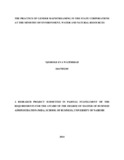| dc.description.abstract | Gender mainstreaming is the consistent use of a gender perspective at all stages of the
development and implementation of policies, plans, programmes and projects. It involves
simultaneously bringing about institutional change to ensure the empowerment of both women
and men through equal participation in decision-making on issues which affect their lives;
analyzing all government policies and practices to examine the differential impact they have on
men and women; and providing training and capacity building to enhance gender management
skills and raise the general level of gender awareness. It is therefore, an essential part of good
governance and is critical to ensure that institutions, their policies and programmes respond to
the needs and interests of all employees, and distribute benefits equitably between men and
women. The objective of the study was to determine the practice of gender mainstreaming in the
state corporations in the Ministry of Environment, Water and Natural Resources. The key
findings are; Women’s access in decision-making has improved since the introduction of the
gender policy in year 2000. Secondly, there is a strong representation of women in senior
management in the parastatals. 30% is used as the benchmark for organizations use as an
indicator for the success of gender mainstreaming and continuous training on gender
mainstreaming is the only tool used to capacitate employees in all the organizations. As the
situation currently stands there is not a strong enough commitment within the parastatals, beyond
numerical targets, to actually create the necessary enabling environment for gender
mainstreaming and gender equality. Organizational cultures need to be revisited and changes
made to the way we work in order to shape policies and programmes and thereby eliminate those
laws, structures and behaviour that allow for gender inequalities to be perpetuated. This requires
the development of new skills, working methods and tools, and the changing of attitudes. | en_US |

